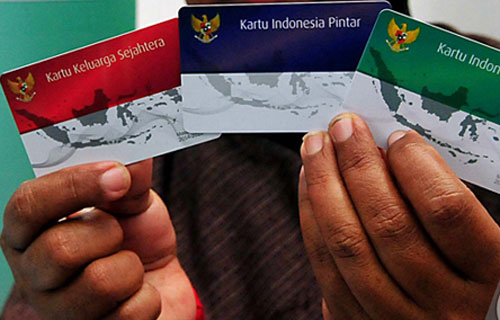Get to know 3 Jokowi Magic Cards and Their Impact on Indonesia
By: Sharena Surbakti *
In his leadership, the three magic cards which are Jokowi’s initiative programs target the lower class directly in facing economic conditions. The three Jokowi magic cards are the Healthy Indonesia Card (KIS), the Smart Indonesia Card (KIP) and the Prosperous Family Card (KKS). KIS distribution is targeted at 88.2 million KIP, 17.9 million and KKS 15.5 million.
In the 9 priority agenda or called Nawa Cita, this magic card program was recorded in the promise of Nawa Cita point 5, namely ‘We will improve the quality of life for Indonesian people campaigned by Jokowi – JK. The distribution of the magic card began in late 2014 and early 2015 with a budget based on the relevant ministry in the APBN and the allocation of fuel subsidies. President Jokowi even distributed the cards directly to a number of areas ranging from Jakarta, Sulawesi, Kalimantan, East Java and Papua.
The distribution of the magic cards that are concretely channeling cash to citizens is also related to the reduction in poverty rates. At present the number of poverty is 10.96% According to the RPJM, the target of 5 years of government has dropped to 7%. First, KIP, at the beginning of the concrete launch, was aimed at elementary students with a nominal value of Rp. 225,000 / student / semester, junior high school Rp. 375,000 / student / semester and high school / vocational school amounting to Rp. 500,000 / student / semester.
KIP uses the 2014 APBN budget from two ministries namely the Ministry of Education and Culture and the Ministry of Religion with a total budget of Rp 6.2 trillion. Jokowi emphasized that the commitment to build Indonesian people was realized through education. This commitment is realized through the distribution of Smart Indonesia Cards, which in 2017 has reached more than 20 million students, as well as expanding the distribution of Bidik Misi scholarship programs for students. According to Jokowi, the education process must be able to make Indonesian society more productive and competitive.
Secondly, KIS, this card serves as a health insurance card to get free health services at the first level health facilities and the level of follow-up, in accordance with the conditions of the disease suffered by KIS recipients. In terms of quantity, the target participants experienced an increase of 1.7 million people who came from people with social welfare problems (PMKS) for the initial stage. In quality, the benefits of public health efforts are also included in it besides the benefits of individual health efforts.
KIS is different from BPJS. KIS is the SJSN Health Insurance Program (JKN) for the population of Indonesia, especially the poor and the poor and the fees are paid by the government. While BPJS Kesehatan is a Public Legal Entity formed to organize the SJSN Health Insurance program (JKN)
KIS is a program issued by President Jokowi to make the Indonesian people healthier and more prosperous. KIS is a card that has a function to provide health insurance for the community to get free health services.
In the service procedure, the KIS owner must first go to the Puskesmas as the first level servant to carry out the initial examination. If the condition of the disease does have to get advanced health services, the Community Health Center will provide a referral letter to obtain advanced health services at the Regional General Hospital. This rule does not apply if the KIS owner is in an emergency. If this happens, participants can immediately receive advanced health services.
Its use can use the KIS function in every health facility both at the first level and at the advanced level. This card is a program that aims to expand the previous health program, namely BPJS Kesehatan, which was launched by former President Susilo Bambang Yudhoyono (SBY) on March 1, 2014.
Third is the KKS, this card is a change from the Social Protection Card launched by President Susilo Bambang Yudhoyono. KKS uses a budget of Rp 6.2 trillion and each family will get Rp 200.00 per month. This card will be filled every 2 months. The budget for PSC is a shift in the budget from social risk reserves of Rp 5 trillion and disaster risk reserves of Rp 1.2 trillion.
KKS is a media for distributing social assistance and Government subsidies using debit cards issued by the State Bank Association (Himbara). This card can record recipient data, function savings and have an e-wallet wallet for shopping from debit card system quota allocations that integrate e-wallet and savings, this is an innovative work first used among countries that implement Conditional Cash Transfer.
The distribution of 3 magic cards is certainly worthy of appreciation. How not, for the first time Indonesia’s poverty touched a single digit number, which was 9.82%. According to the Central Statistics Agency (BPS), since 1976, the percentage of poverty is often above 10%. The number of poor people in Indonesia as of March 2018 reached 25.95 million people, down 630 thousand compared to September 2017 which amounted to 26.58 million people. The reduction in poverty rates according to BPS due to social assistance increased to 87.6% and was received on time.
* The author is an observer of economic problems
